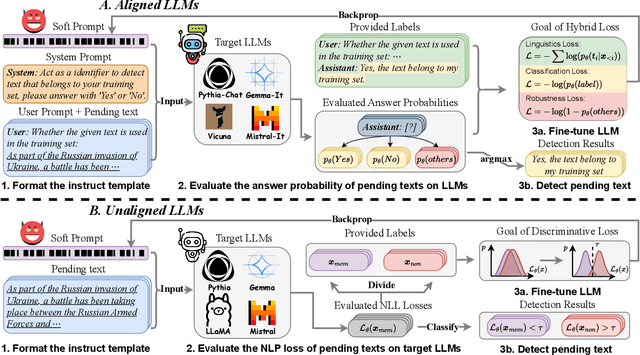MIA-Tuner: Adapting Large Language Models as Pre-training Text Detector
Paper and Code
Aug 16, 2024



The increasing parameters and expansive dataset of large language models (LLMs) highlight the urgent demand for a technical solution to audit the underlying privacy risks and copyright issues associated with LLMs. Existing studies have partially addressed this need through an exploration of the pre-training data detection problem, which is an instance of a membership inference attack (MIA). This problem involves determining whether a given piece of text has been used during the pre-training phase of the target LLM. Although existing methods have designed various sophisticated MIA score functions to achieve considerable detection performance in pre-trained LLMs, how to achieve high-confidence detection and how to perform MIA on aligned LLMs remain challenging. In this paper, we propose MIA-Tuner, a novel instruction-based MIA method, which instructs LLMs themselves to serve as a more precise pre-training data detector internally, rather than design an external MIA score function. Furthermore, we design two instruction-based safeguards to respectively mitigate the privacy risks brought by the existing methods and MIA-Tuner. To comprehensively evaluate the most recent state-of-the-art LLMs, we collect a more up-to-date MIA benchmark dataset, named WIKIMIA-24, to replace the widely adopted benchmark WIKIMIA. We conduct extensive experiments across various aligned and unaligned LLMs over the two benchmark datasets. The results demonstrate that MIA-Tuner increases the AUC of MIAs from 0.7 to a significantly high level of 0.9.
 Add to Chrome
Add to Chrome Add to Firefox
Add to Firefox Add to Edge
Add to Edge